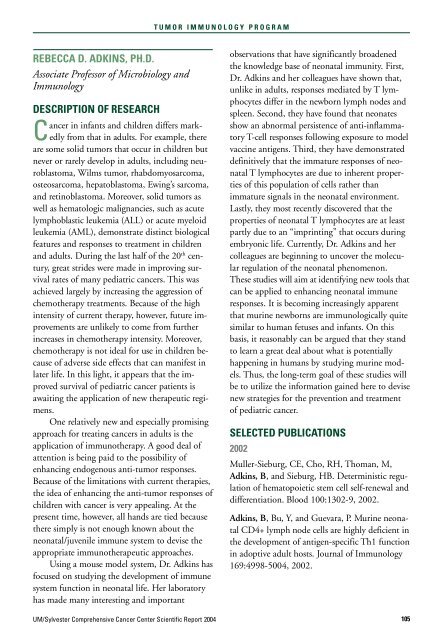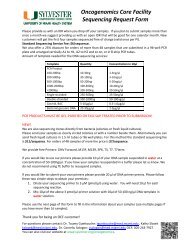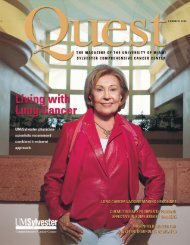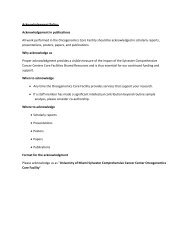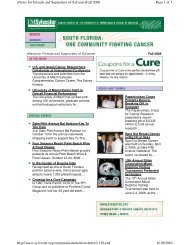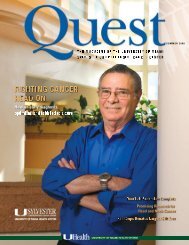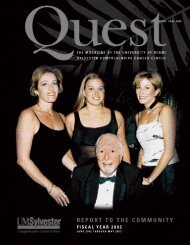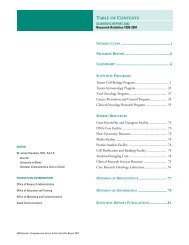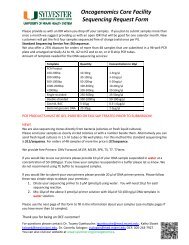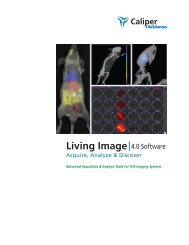SCIENTIFIC REPORT 2004 - Sylvester Comprehensive Cancer Center
SCIENTIFIC REPORT 2004 - Sylvester Comprehensive Cancer Center
SCIENTIFIC REPORT 2004 - Sylvester Comprehensive Cancer Center
Create successful ePaper yourself
Turn your PDF publications into a flip-book with our unique Google optimized e-Paper software.
T U M O R I M M U N O L O G Y P R O G R A M<br />
REBECCA D. ADKINS, PH.D.<br />
Associate Professor of Microbiology and<br />
Immunology<br />
DESCRIPTION OF RESEARCH<br />
<strong>Cancer</strong> in infants and children differs markedly<br />
from that in adults. For example, there<br />
are some solid tumors that occur in children but<br />
never or rarely develop in adults, including neuroblastoma,<br />
Wilms tumor, rhabdomyosarcoma,<br />
osteosarcoma, hepatoblastoma, Ewing’s sarcoma,<br />
and retinoblastoma. Moreover, solid tumors as<br />
well as hematologic malignancies, such as acute<br />
lymphoblastic leukemia (ALL) or acute myeloid<br />
leukemia (AML), demonstrate distinct biological<br />
features and responses to treatment in children<br />
and adults. During the last half of the 20 th century,<br />
great strides were made in improving survival<br />
rates of many pediatric cancers. This was<br />
achieved largely by increasing the aggression of<br />
chemotherapy treatments. Because of the high<br />
intensity of current therapy, however, future improvements<br />
are unlikely to come from further<br />
increases in chemotherapy intensity. Moreover,<br />
chemotherapy is not ideal for use in children because<br />
of adverse side effects that can manifest in<br />
later life. In this light, it appears that the improved<br />
survival of pediatric cancer patients is<br />
awaiting the application of new therapeutic regimens.<br />
One relatively new and especially promising<br />
approach for treating cancers in adults is the<br />
application of immunotherapy. A good deal of<br />
attention is being paid to the possibility of<br />
enhancing endogenous anti-tumor responses.<br />
Because of the limitations with current therapies,<br />
the idea of enhancing the anti-tumor responses of<br />
children with cancer is very appealing. At the<br />
present time, however, all hands are tied because<br />
there simply is not enough known about the<br />
neonatal/juvenile immune system to devise the<br />
appropriate immunotherapeutic approaches.<br />
Using a mouse model system, Dr. Adkins has<br />
focused on studying the development of immune<br />
system function in neonatal life. Her laboratory<br />
has made many interesting and important<br />
observations that have significantly broadened<br />
the knowledge base of neonatal immunity. First,<br />
Dr. Adkins and her colleagues have shown that,<br />
unlike in adults, responses mediated by T lymphocytes<br />
differ in the newborn lymph nodes and<br />
spleen. Second, they have found that neonates<br />
show an abnormal persistence of anti-inflammatory<br />
T-cell responses following exposure to model<br />
vaccine antigens. Third, they have demonstrated<br />
definitively that the immature responses of neonatal<br />
T lymphocytes are due to inherent properties<br />
of this population of cells rather than<br />
immature signals in the neonatal environment.<br />
Lastly, they most recently discovered that the<br />
properties of neonatal T lymphocytes are at least<br />
partly due to an “imprinting” that occurs during<br />
embryonic life. Currently, Dr. Adkins and her<br />
colleagues are beginning to uncover the molecular<br />
regulation of the neonatal phenomenon.<br />
These studies will aim at identifying new tools that<br />
can be applied to enhancing neonatal immune<br />
responses. It is becoming increasingly apparent<br />
that murine newborns are immunologically quite<br />
similar to human fetuses and infants. On this<br />
basis, it reasonably can be argued that they stand<br />
to learn a great deal about what is potentially<br />
happening in humans by studying murine models.<br />
Thus, the long-term goal of these studies will<br />
be to utilize the information gained here to devise<br />
new strategies for the prevention and treatment<br />
of pediatric cancer.<br />
SELECTED PUBLICATIONS<br />
2002<br />
Muller-Sieburg, CE, Cho, RH, Thoman, M,<br />
Adkins, B, and Sieburg, HB. Deterministic regulation<br />
of hematopoietic stem cell self-renewal and<br />
differentiation. Blood 100:1302-9, 2002.<br />
Adkins, B, Bu, Y, and Guevara, P. Murine neonatal<br />
CD4+ lymph node cells are highly deficient in<br />
the development of antigen-specific Th1 function<br />
in adoptive adult hosts. Journal of Immunology<br />
169:4998-5004, 2002.<br />
UM/<strong>Sylvester</strong> <strong>Comprehensive</strong> <strong>Cancer</strong> <strong>Center</strong> Scientific Report <strong>2004</strong> 105


